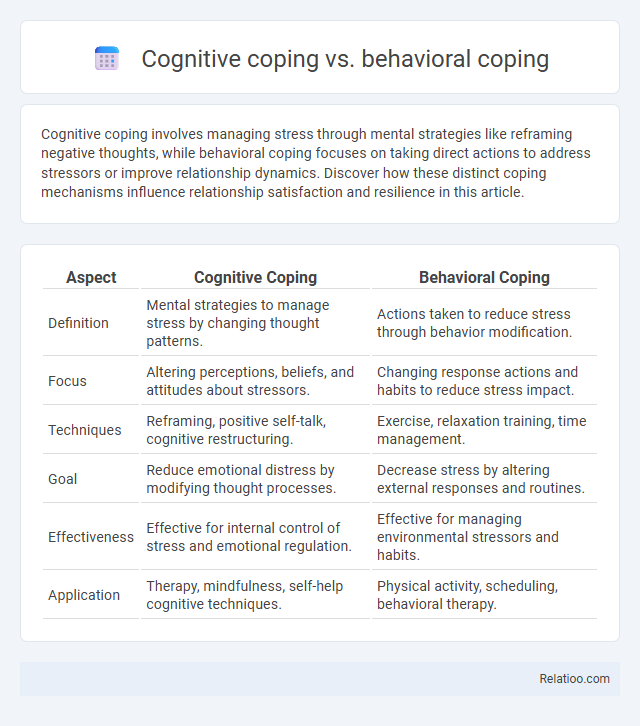Cognitive coping involves managing stress through mental strategies like reframing negative thoughts, while behavioral coping focuses on taking direct actions to address stressors or improve relationship dynamics. Discover how these distinct coping mechanisms influence relationship satisfaction and resilience in this article.
Table of Comparison
| Aspect | Cognitive Coping | Behavioral Coping |
|---|---|---|
| Definition | Mental strategies to manage stress by changing thought patterns. | Actions taken to reduce stress through behavior modification. |
| Focus | Altering perceptions, beliefs, and attitudes about stressors. | Changing response actions and habits to reduce stress impact. |
| Techniques | Reframing, positive self-talk, cognitive restructuring. | Exercise, relaxation training, time management. |
| Goal | Reduce emotional distress by modifying thought processes. | Decrease stress by altering external responses and routines. |
| Effectiveness | Effective for internal control of stress and emotional regulation. | Effective for managing environmental stressors and habits. |
| Application | Therapy, mindfulness, self-help cognitive techniques. | Physical activity, scheduling, behavioral therapy. |
Introduction to Coping Mechanisms
Coping mechanisms are strategies individuals use to manage stress and emotional challenges, categorized primarily into cognitive coping, behavioral coping, and general coping approaches. Cognitive coping involves mental processes like reframing thoughts and problem-solving to reduce stress, while behavioral coping emphasizes actions such as seeking support, exercise, or relaxation techniques. Understanding these distinctions can help Your approach to stress management by tailoring coping strategies to your specific needs and circumstances.
Defining Cognitive Coping
Cognitive coping involves mental strategies such as reframing thoughts and focusing on problem-solving to manage stress and emotional challenges. Behavioral coping, on the other hand, includes actions like seeking support, engaging in physical activity, or avoiding stressors to regulate emotions and reduce distress. Understanding your preferred coping style helps tailor effective stress management techniques for improved mental health resilience.
Defining Behavioral Coping
Behavioral coping refers to the specific actions and strategies individuals employ to manage stressors and emotional challenges through observable behaviors, such as seeking social support or engaging in problem-solving activities. It contrasts with cognitive coping, which involves mental processes like reframing thoughts or altering perceptions to reduce stress. Understanding behavioral coping is essential for designing interventions that promote adaptive habits and improve psychological resilience.
Key Differences Between Cognitive and Behavioral Coping
Cognitive coping involves mentally reframing or changing your perception of stressful situations, while behavioral coping focuses on taking direct actions to manage or reduce stressors. Key differences include that cognitive coping works internally by altering thought patterns, whereas behavioral coping emphasizes external behaviors and problem-solving strategies. Understanding these distinctions helps you choose the most effective coping method based on whether the stressor is controllable or requires emotional regulation.
Theoretical Foundations of Coping Strategies
Cognitive coping involves mental processes that alter perception or interpretation of stressors, rooted in Lazarus and Folkman's Transactional Model of Stress and Coping, which emphasizes appraisal and coping as dynamic responses. Behavioral coping encompasses actions taken to manage or reduce stress, supported by Bandura's Social Cognitive Theory, highlighting the role of self-efficacy and learned behaviors in stress management. Your understanding of these theoretical foundations helps tailor effective coping strategies by addressing both internal thought patterns and external behaviors in response to stress.
Examples of Cognitive Coping Techniques
Cognitive coping techniques include strategies like positive self-talk, cognitive restructuring, and mindfulness meditation aimed at changing thought patterns to reduce stress and anxiety. Behavioral coping focuses more on actions, such as exercising, problem-solving, or seeking social support, to manage emotional challenges. You can effectively manage stress by integrating cognitive tools like reframing negative thoughts with behavioral methods like relaxation exercises for comprehensive coping.
Examples of Behavioral Coping Techniques
Behavioral coping techniques involve active strategies to manage stress through specific actions such as exercise, time management, and seeking social support. Engaging in regular physical activity helps reduce anxiety and improves mood by releasing endorphins, while organizing tasks enhances control and decreases overwhelm. Joining support groups or talking with friends provides emotional relief and practical advice, making these techniques effective for handling daily stressors.
When to Use Cognitive vs Behavioral Coping
Cognitive coping involves changing your thought patterns to manage stress, while behavioral coping focuses on altering actions and behaviors to address challenges. You should use cognitive coping when the stressor is internal or related to perception, such as anxiety or negative thinking, and behavioral coping when dealing with external situations requiring practical problem-solving or lifestyle changes. Combining both strategies can enhance resilience and improve overall stress management effectiveness.
Impact of Coping Strategies on Mental Health
Cognitive coping involves reframing negative thoughts to reduce stress, while behavioral coping focuses on changing actions to manage emotional responses. Your mental health benefits significantly when adaptive strategies, such as problem-solving or mindfulness, are consistently used, leading to lower anxiety and improved emotional regulation. Ineffective coping methods may exacerbate symptoms of depression and increase vulnerability to chronic stress.
Integrating Cognitive and Behavioral Coping for Resilience
Integrating cognitive and behavioral coping strategies enhances your resilience by addressing both thought patterns and actions during stress. Cognitive coping involves reframing negative thoughts, while behavioral coping focuses on adaptive actions like problem-solving and seeking support. Combining these approaches creates a comprehensive coping mechanism that strengthens emotional regulation and promotes effective stress management.

Infographic: Cognitive coping vs Behavioral coping
 relatioo.com
relatioo.com